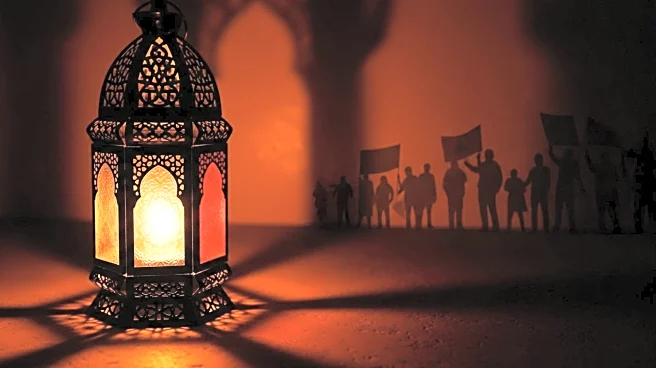What is the story about?
What's Happening?
In Morocco, youth-led protests have intensified following the deaths of three individuals during demonstrations in the southern city of Lqliâa. The protests, which began as a call for social justice reforms, have been organized by a group known as GenZ 212. This group has utilized social media platforms like TikTok and Discord to mobilize support. The unrest was initially sparked by dissatisfaction with public services, particularly in education and healthcare, following the deaths of eight women in a public hospital in Agadir. The protests have spread to multiple cities, with demonstrators expressing anger over government spending priorities, particularly the investment in infrastructure for the 2030 World Cup, while public services remain underfunded. The Moroccan government, led by Prime Minister Aziz Akhannouch, has praised the security forces' response and expressed willingness to engage in dialogue.
Why It's Important?
The protests in Morocco highlight significant socio-economic disparities and public dissatisfaction with government priorities. The unrest underscores a broader regional trend of youth-led movements demanding better governance and accountability. The focus on public spending priorities, particularly the contrast between investment in World Cup infrastructure and inadequate public services, reflects deep-seated grievances about corruption and inequality. The situation poses a challenge to the Moroccan government, which must balance maintaining order with addressing the legitimate concerns of its citizens. The outcome of these protests could influence future policy decisions and impact Morocco's political stability.
What's Next?
The Moroccan government has indicated a willingness to discuss healthcare and hospital reforms, with a parliamentary meeting scheduled to address these issues. Meanwhile, GenZ 212 has announced plans for further peaceful protests, signaling that the unrest may continue. The government's response to these demands and the ability to engage constructively with protestors will be crucial in determining the trajectory of the situation. International observers and human rights organizations may also increase scrutiny on Morocco's handling of the protests, potentially influencing diplomatic relations and foreign investment.
Beyond the Headlines
The protests in Morocco are part of a larger pattern of youth-led movements across the globe, particularly in regions experiencing rapid urbanization and economic challenges. These movements often arise in contexts where young populations face limited opportunities and are more connected through digital platforms. The Moroccan protests also raise questions about the role of social media in organizing and sustaining social movements, as well as the potential for such platforms to facilitate both peaceful and violent actions. The situation in Morocco could serve as a case study for understanding the dynamics of modern protest movements and the challenges they pose to traditional governance structures.















